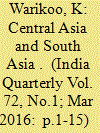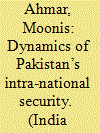|
|
|
Sort Order |
|
|
|
Items / Page
|
|
|
|
|
|
|
| Srl | Item |
| 1 |
ID:
143350


|
|
|
|
|
| Summary/Abstract |
India and Central Asia have shared a geo-cultural affinity and a long tradition of historical contacts that dates back to antiquity. There is convergence of views and interests between the Central Asian Republics and India, on fundamental issues such as; (a) need to maintain social harmony and equilibrium by promoting inter-ethnic harmony and peaceful co-existence; (b) commitment to secularism and democracy and opposition to religious fundamentalism; (c) recognition of threat to regional security and stability from trans-border terrorism, arms and drug trafficking, religious extremism and ethnic-religious secessionism; (d) commitment to the principles of territorial integrity of nation states and inviolability of state borders; (e) promoting economic, scientific and cultural cooperation and (f) ensuring peaceful and tranquil neighbourhood in Afghanistan.
The Central Asian Republics, being cautious and wary of dominating influence of the powerful neighbours like Russia and China look towards India as a friend and partner, which does not have any political or territorial ambitions in the region. India is also expected to play a balancing role in the big power games in Central Asia.
|
|
|
|
|
|
|
|
|
|
|
|
|
|
|
|
| 2 |
ID:
143352


|
|
|
|
|
| Summary/Abstract |
East Asian theatre is fast evolving. China’s arrival as a major power in international politics is altering the existing regional balance of power and intensifying Japan’s quest for securing a rightful place in the international system. Japan is reacting to the asymmetrical power politics and Shinzo Abe is increasingly becoming restless in attempting to redefine Japan’s secondary power identity. This requires undoing the limitations that were forced on Japan in the post-war period, including the constitutional restrictions, especially the pacifist clause. Amid fiercely contested domestic debate, reinterpreting the pacifist constitution is certainly a bold step towards infusing clarity in Japan’s future security role. The key objective is to convey to Japan’s allies concerning the manner the SDF will cooperate with the US and other regional powers, such as Australia, India, Philippines, etc. How this ‘limited’ right to collective self-defence will translate into operation will remain to be seen. To understand the rapidly unfolding policy shift, it is imperative to understand the different waves of the debate on collective self-defence and deconstruct the recent cabinet decision; explore the arguments of the competing schools of thought in Japan; examine the nuances and drivers that propelled Japan to redefine its passive constitution; and understand how regional and extra-regional powers evaluate this policy reorientation. Few regional stakeholders raised an alarm over the approach adopted by Abe to achieve the policy objective underscoring his militarist ambitions. While the aggressive historical baggage has caused considerable unease, it is premature to be alarmed over Japan’s shifting security posture as possible re-militarisation is unlikely to represent the traits of Imperial Japan.
|
|
|
|
|
|
|
|
|
|
|
|
|
|
|
|
| 3 |
ID:
143351


|
|
|
|
|
| Summary/Abstract |
The debate and discourse to change the provincial map of Pakistan by creating new provinces is not a new phenomenon and is considered as a major challenge to intra-national security and to the centripetal forces who still want Pakistan to be a unitary/centralised state instead of a federal state. What is intra-national security and how can the issue of creating new provinces have a major impact on the dynamics of national security at different levels? When compared with national security, which deals with the whole country, intra-national security relates to contradictions and variations in the security dynamics and paradigms in different parts of the country. Pakistan as a multiethnic, multilingual, multicultural and multi-religious state can effectively deal with issues of security if intra-national security is accepted as a reality and is beyond the scope of national security. Matters and issues relating to different regions of Pakistan located in its provinces can at best be understood in terms of intra-national security. If the approach of major power stakeholders in Pakistan is positive, and they wish to peacefully address issues that cause friction, instability, chaos, disorder and violence in different provinces because of social, economic and political injustices, they must seriously consider proposal to upgrade existing divisions of Pakistan into provinces. For that matter, proper brainstorming by the concerned stakeholders including civil society groups needs to be done so that consensus is reached on the methodology to create new provinces in Pakistan.
|
|
|
|
|
|
|
|
|
|
|
|
|
|
|
|
| 4 |
ID:
143353


|
|
|
|
|
| Summary/Abstract |
This study examines the bilateral trade relations between New Zealand and India from 1990 to 2014. Using export and import intensity indices and revealed comparative advantage (RCA) indices, it identifies sectors where there is static and dynamic comparative advantage and complementarities. It also examines the extent and movement of intra-industry trade (IIT), using IIT indices, and analyses these indices to consider how trade patterns and relations have changed between 1990 and 2014.
Findings show that trade between New Zealand and India has increased in recent years. The intensity of trade has strengthened, and there has been growth in IIT for a number of industries and product groups. Results also suggest high degree of static and dynamic comparative advantage in a number of product groups. The findings of this study should be relevant to future bilateral trade, economic relations, technology transfer and cultural exchange between New Zealand and India.
|
|
|
|
|
|
|
|
|
|
|
|
|
|
|
|
| 5 |
ID:
143354


|
|
|
|
|
| Summary/Abstract |
Successive Nigerian administrations have pursued one variant of reform or another in the federal civil service since the country’s attainment of political independence. Yet, the federal civil service, as an essential organ of the executive arm of the government, still requires more reforms. The problems that instigated the introduction of a series of reforms in the federal civil service in 1999 consequent upon the inauguration of the democratic government included erosion of public service ethics, ageing workforce, poor succession planning, inappropriate organisational structures, unproductive work operations, lack of competent leadership, etc. However, these problems are currently the same problems facing the federal civil service after 16 years of implementation of reforms by the government of Peoples’ Democratic Party (PDP). However, the emergence of a new government with its populist and progressive policy thrust, the rising awareness among civil servants, the global obligation of the Nigerian government to public service reforms, the proven efficacy of the ballot as an instrument for effecting change of government, coupled with the readily available support of donor agencies, which together, have the prospects of creating the right political atmosphere for the implementation of requisite reforms in the Nigerian federal civil service with utmost efficiency and likelihood of success.
|
|
|
|
|
|
|
|
|
|
|
|
|
|
|
|
|
|
|
|
|